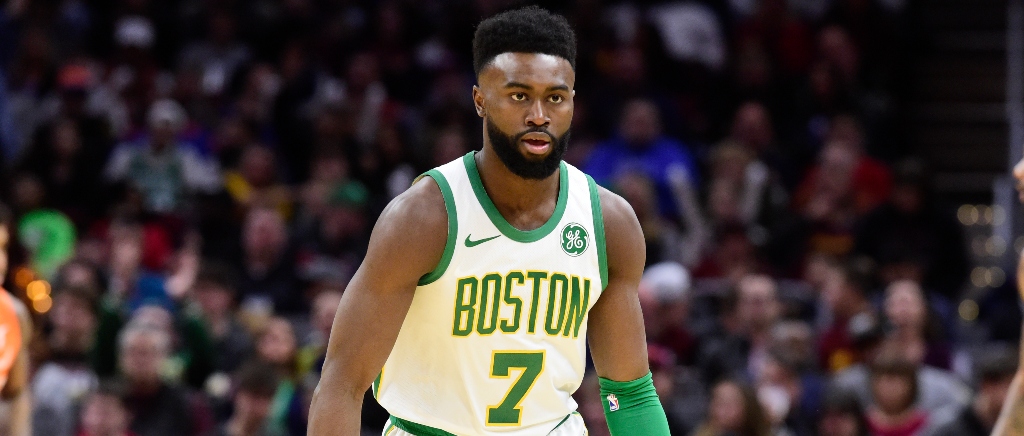
As the NBA prepares to embark on its eight-game seeding restart in the Disney bubble on Thursday night, players continue to try and keep attention on the fight for social justice and the need to address systemic racism throughout American society.
The league is working on various initiatives to use its resources to help address those problems, most notably discussions with the NBPA on a foundation that will be funded with a reported $300 million to go to various areas of need (with the NBPA being a part of deciding where funding goes). While that is yet to be finalized, players continue to use their platform of post-game press conferences to emphasize the need for justice for Breonna Taylor, calling on the Kentucky attorney general to file charges against the officers who shot her while she was sleeping, and also offering other messages to the community.
Jaylen Brown has been a prominent voice throughout his career on social issues, and was part of organizing a protest march in his hometown of Atlanta after the murder of George Floyd by police sparked nationwide protests against police brutality. On Wednesday, Brown opened his availability with a two-minute statement, again calling for justice for Breonna Taylor and also issuing a plea for people to get out and vote — while also addressing one of the major reasons people in the Black community sometimes feel like voting doesn’t matter.
Breonna Taylor. Voting. Using his platform to inspire and educate.
Here is Jaylen Brown’s thoughtful opening statement before an engaging media session that centered largely on the quest for change. pic.twitter.com/WrpN2PagtY
— Chris Forsberg (@ChrisForsberg_) July 29, 2020
“I want to continue to demand justice for Breonna Taylor. I want that to continue to be reiterated while I’m down here. Also, I want to encourage people in my community to get out and vote. Not just for presidential elections, but state representatives, elected officials, etc. I think there’s a lot of power in coming together and voting. Especially in the Black community, politicians have made empty promises to the Black community year after year after year, and they think it’s OK and acceptable, and it’s not. So, I want to emphasize that we gotta continue to vote. We gotta come together and use our power and utilize it in the right manner. I want to inspire people in Georgia, where I’m from, Marietta, Gwinnett county, Boston, Massachusetts, Dorchester, Roxbury, Oakland, East Oakland, West Oakland, wherever my influence reaches I want people to vote. There’s a lot of power in exercising that and we gotta use it. So I want to continue to emphasize that, cause we’ve got to get some of these guys out of office who don’t care or don’t think it’s appropriate that we are trying to end systemic racism.
“I want to make voting a strength. I want to use my platform. I want to have people come together and talk about it. I understand the apprehension from the African-American community. Politicians have been making empty promises as well as people feeling like why would I participate in a political system that hasn’t necessarily participated with me. But I believe in small victories, and getting those guys [out] and the right people into office, I think a lot of that is voting. Let’s continue to express that. Let’s continue to lead in that direction and I want to use my platform to inspire people to use their influence, whatever color, whatever race, it’s always important, especially in the Black community, let’s exercise our power and get out and vote.”
Brown points out a problem that often leads to voter apathy, particularly within the Black community and other minority communities, which is how there can be no candidates on the ballot who are directly engaging with those communities and speaking on the issues that are most important to them. It’s something he understands, and needs to be addressed at a party level with bringing in more diverse candidates who are willing to engage in conversations and issues that impact these communities.
There are far more reasons why voter turnout can be low, including various voter suppression tactics that can cause tremendous wait times at polling places in minority communities to policies like Florida’s law that forces ex-felons to pay any fines still owed to the state before being allowed to vote. The latter issue is something LeBron James’ “More Than A Vote” campaign is looking to address, raising funds to pay off those debts and rid that hurdle for voters.
Brown’s other point of emphasizing the need to vote at a local level is important as well, because while national politics dominate news coverage, it is the local elections that often dictate the policies that most impact these communities and is also the beginning of the path to introducing more diverse candidates to the experience that can get them to larger positions.
